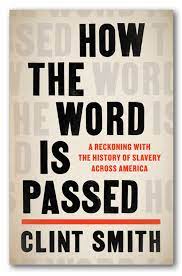2021/2022 Academic Year: Memory
As a new year begins, many of us long for the way things were. The idea that the previous world or in our case university experience is the desirable outcome is easy to understand. We all possess memories of what came before and long for many of those relationships and occasions returning just as we remember. An issue with this sentiment is nicely summarized in the following quote from this year’s common read: Clint Smith’s 2021 How the Word is Passed: A Reckoning with the History of Slavery Across America:
I think history is the story of the past, using all the available facts, and that nostalgia is a fantasy about the past using no facts, and somewhere in between is memory. Historian Dr. Ana Lucia Araujo
In this passage, Dr. Araujo is addressing a question about the House of Slaves on Goree Island, Senegal (Chapter 7). At the House of Slaves, estimates of the number of human beings trafficked through the site have been shown by historical examination to be widely inaccurate. To this problem, Clint Smith inquires:
Can a place that misstates a certain set of facts still be a site of memory for a larger truth?
By selecting Memory as our theme, we set out on a journey and invite all to see both their individual and our collective larger truths. To do so we encourage the creation and delivery of programming and activities that promote both inquiries into fact and opportunities to find respite from the myriad crisis we face in nostalgia. By doing so, we seek to find and create new memories that do not suffer from the gaps found in the historical record that extend well beyond the rise of slavery on the coasts of Africa. Can we set nostalgic fantasy free from maliciousness and misinformation? What gaps can be closed? New and better memories require learning from the past and not repeating our mistakes.
So let us work together to not just build an Old Cortland or World, but create generous, curious, earnest, healthy, and vibrant spaces that close gaps and are worthy of nostalgic fantasy and also records facts that we are proud of and can present honestly to future generations.
Our Common Read
After giving such an inspirational and thought provoking discussion about his work and specifically his then forthcoming book How the Word is Passed: A Reckoning with the History of Slavery Across America, we could not resist selecting his book as this year's common read. We are not along in singing the praises of this spectacular book. Pulitzer Prize-winning author of Evicted call it:
A work of moral force and Humility. Clint Smith Moves Seamlessly between the past and the present, revealing how slavery is remembered and misremembered - and why it matters.

Common Read Book Discussion
This 2021-2022 academic year at SUNY Cortland, all faculty, staff, students, and alumni are invited to participate in a book discussion of Clint Smith's new title How the Word is Passed: A Reckoning with the History of Slavery Across America. \ Led by Evan Faulkenbury (history department) and Jeremy Pekarek (archivist and instructional services librarian), the book discussion will be a space for us to share ideas and insights about what we're learning as we consider this important history.
Please register for the book discussion if you are interested. If you would like to participate, you will need to purchase or borrow the book for yourself. The book discussion will meet in person (socially distant and with a max allotment for safety amid COVID-19), but anyone may join us live virtually. We'll be meeting in a classroom designed for virtual learning, so anyone joining us online may participate.
Our first meeting (discussing the prologue and first chapter on Monticello) will be on Friday, September 24 from 1-2 p.m. in Sperry 309. Our second meeting (discussing the second chapter on the Whitney plantation) will be on Friday, October 29 from 1-2 p.m. in Sperry 309. Our third meeting (discussing the chapter on Angola Prison) will be on Friday, November 19 from 1-2 p.m. in Sperry 309. We will plan out and continue our discussion during the spring semester.
If you have any questions, please email us at evan.faulkenbury@cortland.edu and jeremy.pekarek@cortland.edu.
Fall Events
Thursday, Sept. 16, 4 p.m. - Gallery Pit, Dowd Gallery. Yasha Rozov will discuss the transformational power of site-specific and socially engaged art practice in changing perceptions and experiences of public spaces and migrant communities in Israel. Yasha Rozov showcases a creative approach of public art as a path to reconciliation.
Tuesday, Nov. 2, 5 - 6:30 p.m. - Sperry Center, 204. Rossen Djagalov is visiting from NYU to deliver a talk titled: The End of the Affair: Reflecting on the Ruins of Soviet Third-World Cultural Engagements.
Contact: cic.committee@cortland.edu
The Cultural and Intellectual Climate Committee (CICC) is an all-campus committee of faculty and staff appointed by the Provost. Each year members of the Committee choose a theme to frame a year-long series of lectures, discussions, film screenings, and art exhibitions. This theme is meant to promote cultural life on campus and help the campus and Cortland community engage in discussions connected to issues relevant to today's world.
If you are a member of SUNY Cortland's faculty or staff and would like to participate in the CICC, please contact Benjamin Wilson, the committee's chair. If you are member of the student body or the Cortland community and have a suggestion for a speaker or event, please feel free to contact us as well.